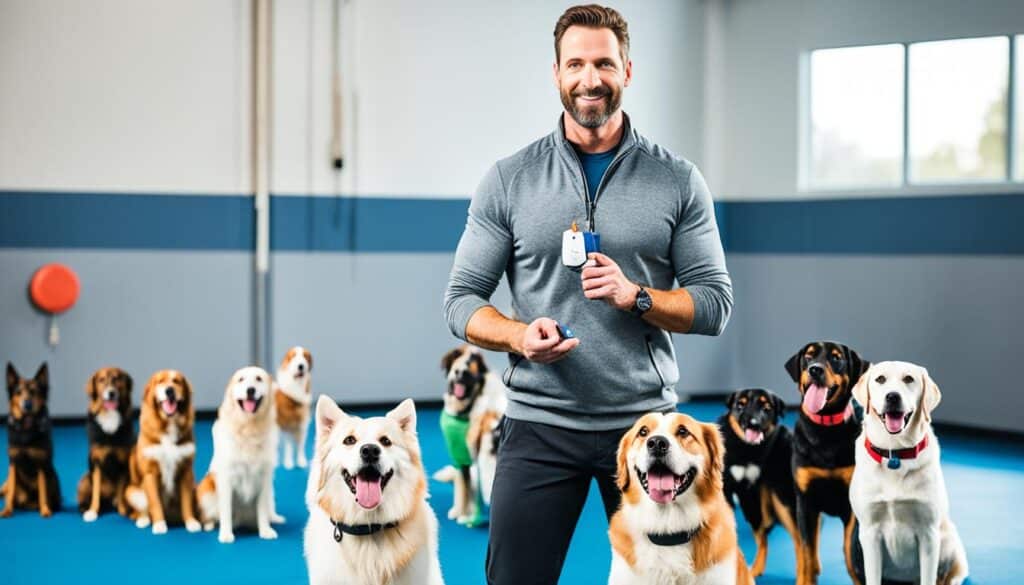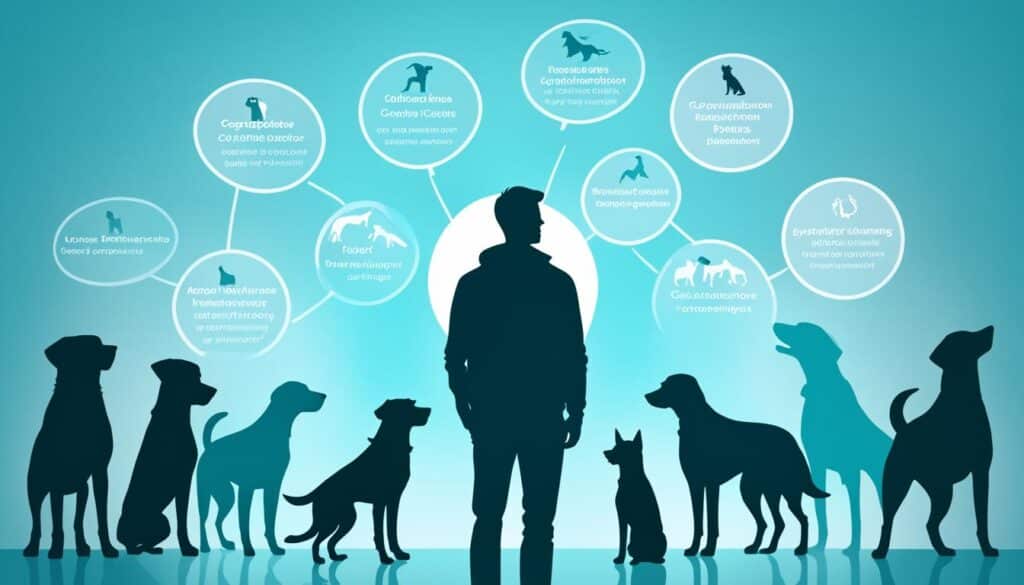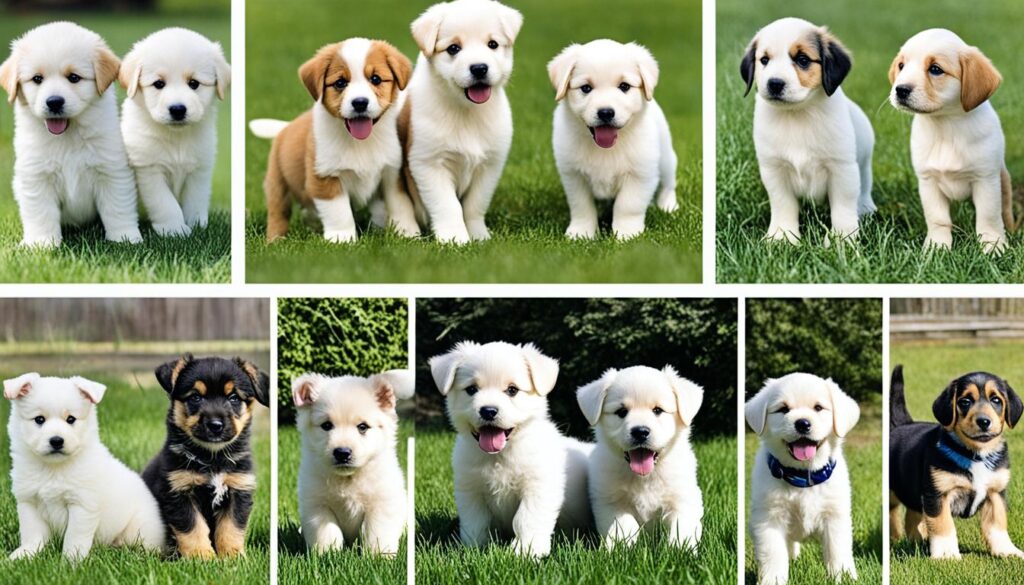Finding the right dog trainer is critical for your pet’s growth and behavior. A professional trainer influences your dog’s actions and helps you get along better.
Do you need help finding the best trainer? This guide will help you pick someone skilled in positive methods. You’ll also learn how to spot real experts and the value of kind training.
Are you facing issues or want a stronger connection with your dog? The tips in this article will help you. Let’s find the best trainer together, unlocking the full potential of training for you and your dog.

Key Takeaways:
- Choosing the right dog trainer is essential for your dog’s development and behavior.
- Professional dog trainers specialize in positive reinforcement-based methods.
- Certified dog trainers have the necessary qualifications and expertise.
- Safe and humane training methods should be a priority.
- Proper dog training can strengthen the bond between you and your furry friend.
Why It’s Crucial to Find a Qualified Dog Trainer
A qualified dog trainer makes a big difference in your dog’s life. They help your furry friend behave better and improve their well-being. Not every trainer is the same. It’s vital to pick one who meets your dog’s needs with safe training methods.
Understanding the Impact of Professional Dog Training on Your Dog’s Behavior
Good training does more than teach sit and stay. A skilled trainer can fix issues like barking too much or being too aggressive. They help dogs feel better when left alone.
They know dogs and can find out why they’re misbehaving. Then, they make a plan that’s just for your dog. They make learning fun by rewarding good behavior. This way, training is good for you and your dog.
Professional training gives your dog the skills to be cool in any situation. It helps them get along with others and be happier.
The Difference Between Certified Dog Trainers and Self-Proclaimed Experts
Knowing real trainers from those who say they are is essential. Real trainers have official training and a certificate from well-known groups. They’ve proven they know how to train dogs.
But others might need the proper training or know-how. It’s wise to avoid them, as they might not be suitable for your dog. Picking a certified trainer means you’re with someone who’s good at their work.
Ensuring Safe and Humane Training Methods Are Used
Knowing how to train is one thing, but doing it right is another. The best way to train is by being friendly and upbeat. This is good for your dog and makes them want to learn.
Good trainers use rewards like treats and fun times. They don’t use punishment or force. This makes your dog trust them more. It also makes your bond stronger and your dog happier to learn.
You make sure your dog is well taken care of by picking a skilled trainer who’s also kind. The training process will be good for your dog physically and emotionally.

| Benefits of Finding a Qualified Dog Trainer | The Consequences of Choosing an Unqualified Trainer |
| Expert guidance in addressing behavioral issuesImproved socialization skills for your dogPromotion of positive behavior through appropriate training techniques | Potential exacerbation of behavioral problemsUse of ineffective or outdated training methodsRisk of physical or emotional harm to your dog |
Key Factors to Consider When Choosing a Dog Trainer
Choosing a dog trainer involves looking at several key points. It’s essential to check their credentials and how they train dogs. Always focus on positive ways to teach your dog. Make sure the trainer can meet your dog’s unique needs. This will help both you and your dog succeed in training.
What to Look for in a Dog Trainer’s Credentials and Certification
Start by checking the trainer’s credentials and certification. A good trainer should have the proper education and training. Look for people who have studied dog behavior and training. This shows the trainer is equipped to help your dog learn and behave better.
The Effect of Positive Reinforcement in Dog Training
Training with positive reinforcement is critical. It means rewarding your dog for the good things they do. Pick a trainer who focuses on this. It makes learning fun and strengthens the bond between you and your pet. Training this way improves obedience and your dog’s general behavior.
Assessing a Trainer’s Experience with Your Dog’s Specific Needs
Each dog has different needs, especially when it comes to training. Choosing a trainer who knows how to deal with your dog’s challenges is vital. For instance, if your dog has trouble with aggression, find a trainer with experience. Training will be more effective with someone who has solved similar problems before.
| Key Factors to Consider When Choosing a Dog Trainer |
| Trainer’s Credentials and Certification |
| Emphasis on Positive Reinforcement Methods |
| Experience with Your Dog’s Specific Needs |

Questions Every Dog Owner Should Ask Before Hiring a Trainer
It’s critical to ask specific questions when looking for a dog trainer. These will help you see if the trainer’s beliefs and methods match what you want for your dog. It’s also good to know about the trainer’s background and education. This info will help you trust their skills. Talk about what you hope to achieve with your dog’s training. This makes sure you and the trainer are working towards the same goals.
Understanding a Trainer’s Philosophy and Training Methods
Start by asking the trainer about their approach and how they train dogs. Ensure their style fits what you think is best for your pet. Many trainers use rewards to encourage good behavior instead of punishments. But, some may use methods you don’t like, or that could harm your dog.
Knowing how they train can help you pick a trainer that suits your dog.
The Role of Continuing Education in a Trainer’s Qualifications
Learning never stops, even for dog trainers. So, find out if your potential trainer keeps up with new training methods. Do they go to events and training to learn more? Are they part of groups that help them learn and grow in their field? A trainer who values learning will offer a better service for your dog.
Expectations and Goals Setting for Your Dog’s Training Program
When you’re ready to hire a trainer, discuss what you want your dog to learn. Be clear about the behaviors or skills you hope to improve. Also, mention any problems your dog might have.
Telling the trainer about your goals will help them plan a training program that fits your dog. It’s a crucial step to making the training journey successful for everyone involved.
These questions will help you find a dog trainer that matches your dog’s needs. It will also help you stay true to your dog’s best interests as a caring owner.
Online vs. In-Person Dog Training: Pros and Cons
Choosing the right dog training method is critical. You can pick between classes online or in person. Thinking about what fits your life and works for your dog’s learning style is vital.
Benefits of Hands-On Guidance in In-Person Dog Training Classes
In-person classes come with the perk of real-life guidance from an expert. A trained pro can give quick feedback, keeping your dog’s training on point. This is great for dogs needing extra attention or having behavioral challenges.
Also, your dog gets to hang out with other dogs in these classes. This helps them get better at socializing and learning how to act around other dogs. It’s super helpful for shy dogs or those not used to being around others.
The Convenience and Flexibility of Online Dog Training
Online training is all about being accessible and flexible. You can pick sessions that work around your life. This is perfect for busy folks who need help to commit to regular class times.
Then, there’s the homey comfort part of online training. It saves you from having to travel. This is a big plus for anyone who needs help finding suitable in-person classes nearby.
Choosing the Right Format for Your Lifestyle and Your Dog’s Learning Style
Think about what kind of learning fits you and your dog best. Some dogs do great in big classes, while others shine in more personalized settings. Your choice should match your dog’s style and your own.
If you like getting out and being in an actual class, that might be what you need. But online training could be better if you’re good at learning independently. The right fit is what’s going to help your dog learn and behave the best.
Whether you go online or in-person, quality training is what your dog needs. Look for a trainer who’s all about positive training and gets your dog’s unique needs.
Red Flags to Watch Out For in Your Dog Trainer Search
Looking for the correct dog trainer is essential. It would help if you watched for warning signs of wrong or even harmful training. Knowing these signs keeps your dog safe during exercise.
Warning Signs of Ineffective and Potentially Harmful Training Practices
While looking for a dog trainer, watch out for these red flags:
- Use of forceful methods: Stay away from trainers who use harsh, old methods. Such techniques can make your dog stressed and anxious.
- Lack of positive reinforcement: Good trainers focus on rewarding good behavior. If a trainer mainly punishes terrible behavior, it could harm your dog.
- Resistance to answering questions or explaining: A good trainer will be open about their methods. If they avoid your questions, it might mean trouble.
- Unrealistic claims or inflated success stories: Trainers making big claims may need to be more honest. Real trainers aim for achievable goals and care about your dog’s well-being.
Being aware of these warning signs helps avoid bad trainers. Always prioritize your dog’s happiness and safety during training.
How To Spot False Claims And Stories
To judge a trainer’s claims, follow these steps:
- Check a trainer’s credentials: Only choose trainers with suitable certifications. Please make sure they’re from trustworthy sources.
- Read reviews and testimonials: Honest feedback from clients can show if a trainer is good. Check for a mix of good and bad reviews.
- Get recommendations from trustworthy people: Friends and local dog folks can tell you who’s good. Their experiences can point you to the right choice.
- Trust your gut: If something feels wrong, it might be. A good trainer’s values should match your own when caring for your dog.
These steps can help you find a trainer who’s the best for your dog. You want someone skilled and kind in their approach.
How to Find the Best Local Dog Trainer Near You
Utilizing Online Resources and Local Dog Communities for Recommendations
Looking for a local dog trainer online is a smart move. Websites and forums are full of info on trainers near you. Also, check out local places like dog parks for firsthand reviews from owners.
For specific training needs, visit online groups or forums. You’ll find trainers who specialize in things like obedience or agility training. This can help you find the perfect match for you and your dog.
What to Look for in Reviews and Testimonials When Finding a Dog Trainer
Reading reviews from other dog owners can tell you a lot. Look for common themes in the feedback. Good reviews should mention how the trainer connects with dogs and helps them learn.
Keep an open mind when reading reviews. A few nasty comments might not mean the trainer is terrible. But, many negative reviews suggest you look elsewhere.
Navigating Certifications: How to Verify a Dog Trainer’s Qualifications
Checking a trainer’s qualifications is vital. Although there’s no one authority in dog training certification, there are trusted organizations. They give certifications that show a trainer is up to date and follows a code of ethics.
The Certification Council for Professional Dog Trainers (CCPDT) and the Karen Pryor Academy are known for offering credible certifications. Visit their websites or get in touch to confirm a trainer’s certification status.
Conclusion
Choosing the right dog trainer is vital for your dog’s happiness and good behavior. A trainer who uses positive ways can make a big difference. They make learning fun for your dog, which leads to good habits sticking around.
When picking a dog trainer, look for someone who is certified. Certified trainers have special training and skills for teaching dogs. This means you’re getting help from someone who knows their stuff.
A certified trainer who uses positive training methods can make your dog feel safe and understood. These methods make learning enjoyable and positive. Plus, they bring you and your dog closer together.
Investing in a certified trainer who focuses on the good is the best for your dog. This choice helps your dog learn well and become a great furry companion. So, choose wisely and start an incredible dog training journey with a certified expert.
FAQ
Why is it essential to find a qualified dog trainer?
Finding a qualified dog trainer is critical. They can train your dog well and fix any destructive behaviors. They use training methods that are both proven by science and kind. This ensures your dog is happy and behaves well. This can be a real game-changer for you and your pup.
How does professional dog training impact a dog’s behavior?
A professional helps your dog learn crucial commands and improve how they get along with others. They also learn to handle any behavior problems. This makes your bond with your dog stronger. It results in a pet that’s both well-behaved and happy.
What is the difference between certified dog trainers and self-proclaimed experts?
Certified trainers have passed tough training and got their credentials from groups like the CCPDT. Self-made experts might need these qualifications, which can be risky for your dog. CCPDT certification is a sign of a knowledgeable trainer who can help your dog safely.
Why is it essential to ensure safe and humane training methods are used?
Safe and kind training keeps your dog’s emotions and well-being in mind. Harsh methods can make dogs scared, anxious, or even aggressive. It’s best for training to focus on being friendly and using rewards. This creates a happy and effective way for your dog to learn.
What factors should be considered when choosing a dog trainer?
Check their qualifications and how they trained. Make sure they focus on reward-positive methods. Also, see if they have worked with dogs like yours and can meet your pet’s needs. This helps ensure the right fit for your furry friend.
What should I look for in a dog trainer’s credentials and certification?
Choose a trainer certified by trusted organizations like the CCPDT. This certification is a sign they know about training dogs well and safely. It ensures your dog is in good hands. Visit the CCPDT website to learn more about this necessary certification.
Why is assessing a trainer’s experience with my dog’s specific needs important?
Every dog is different, and some need special training. Ensure your trainer has the right skills for your dog’s unique needs. A skilled trainer will know how to address specific behavior problems. They can create a customized plan that works.
What questions should I ask before hiring a dog trainer?
Ask about their approach and if it fits with what you want for your dog. Find out if they keep learning new techniques. It’s also important to talk about what you expect from the training. Clear communication from the start can make sure your dog gets the right help.
How do I choose between online and in-person dog training?
Think about what your dog needs and what you prefer. In-person classes let your dog learn hands-on and be around others. Online training is flexible and convenient for you. Choose what matches your dog’s style and your goals best.
What are the red flags to look out for in a dog trainer search?
Avoid trainers who use harsh or old-fashioned methods, claim all the answers, or don’t care about your dog’s well-being. Look out for those with proper skill and care. CCPDT certification is a good sign a trainer is focused on the right things.
How can I find the best local dog trainer near me?
Start by asking people you know and online pet groups for suggestions. Get referrals from those you trust, like friends and your vet. Look for positive reviews and stories from other dog owners that match your situation. Check their credentials to confirm they are a good choice for your dog. CCPDT-certified trainers are often a great option. They’re known for their expertise.

